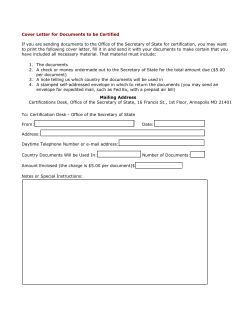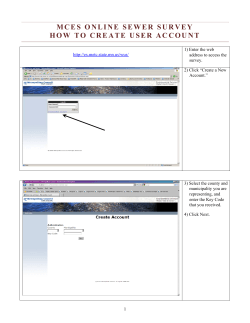
Why Regulatory Authorities Look for the UL the UL Mark Mark
October 2008 For regulatory authorities in the electrical inspection community. Why Regulatory Authorities Look for the UL Mark by Rich Berman In 2007, 21 billion UL Marks appeared on 20,000 different types of products. For the 100,000 product evaluations conducted by UL during the year, many products required redesign or modification before meeting UL’s require requirements ments and becoming eligible to bear the UL Mark. Since 2006, UL has conducted Field Evaluations Evaluations on over 25,000 25,000 pieces of electrical equipment. Well over 50 percent of this equipment has been found to have deficiencies, requiring correction before being eligible for UL’s Field Evalua Evaluati tion on Mark. So when Authorities Having Jurisdiction (A (AHJs) HJs) and other municipal officials are asked why certification of electrical equipment is necessary and why UL is the preferred safety certification organization, the answers are clear. The U.S. system of safety includes standards developing and certification organizations (such as UL), enforcement authorities (AHJs), installation code developers (such as NFPA), federal agencies (such as OSHA), installers and manufacturers. Each of these groups plays an important role, and safety is important to each of them. When we all work together, the result is safer products and installations. This has been the central mission for UL for the last 114 years, and is reflected in everything we do. Trusted Listings The word “listed” appears in over 1,000 locations in the National Electrical Code® (NEC®). Most conductors, cables, and raceways, and many types of electrical equipment are required to be listed. In all cases, UL Listing is a valuable and trusted tool to facilitate acceptance of equipment. The authorization to apply a UL Listing Mark must be earned through rigorous examination, testing and surveillance that demonstrate compliance with nationally recognized safety standards. UL’s expert technical staff is committed to ensuring that these evaluations are done the right way, so AHJs can trust the UL Mark. NEC Section 110.3(B) requires that “Listed or labeled equipment shall be installed and used in accordance with any instructions included in the listing or labeling.” In addition to instructions that are provided with the electrical equipment, UL publishes Guide information for each UL product category. UL’s Guide information contains essential practical information, such as equipment installation and use, product markings, environmental use considerations, and equipment ratings. The basic safety standard used to investigate the equipment for certification is also identified, as a supplement of well as a detailed description of the UL Mark. UL product Guide information is provided on UL’s website at www.ul.com/database or in UL’s White Book, which is provided free of charge at apprentice training, electrical trade shows and events, and AHJ association meetings. The UL White Book is also available for download on UL’s website at www.ul.com/ regulators. UL Supports AHJs UL offers resources to electrical professionals that are unmatched in the industry. Dedicated technical staff members from UL’s Regulatory Services Department attend hundreds of events each year, providing on-the-ground assistance and training classes on code and certification issues. Continued on page 2 Electrical Connections a supplement of The Code Authority® UL Regulatory Services staff attended over 400 events and meetings in both 2006 and 2007, reaching about 25,000 AHJs and other industry professionals. We delivered over 350 technical programs to meeting attendees in 2007 and 2008. UL this database is quickly becoming an indispensable regulatory tool. October 2008 Why to Look for the UL Mark • Active Support of Code DevelopmentUL staff is highly active in model code development, including serving on every Code Making Panel for the NEC and the NEC Technical Correlating Committee. UL’s central role and technical expertise allow for balanced input to the process and active maintenance of the code requirements. • Reliable, Active Development of Safety Standards – UL is the standards developer for hundreds of safety standards that help form the infrastructure of the U.S. safety system. Each of UL’s Standards for Safety are carefully developed for compatibility with the NEC and other U.S. model codes, and provide a uniform and consistent means to evaluate products for safety. • Continuously Moving the Science of Safety Forward – UL has always been in the forefront of the science of safety, and that tradition continues to result in significant safety research. UL is a direct sponsor of important safety research initiatives, such as the National Electrical Grounding Research Project and the recently completed Residential Electrical System Aging Research Project (see report at www.nfpa.org/assets/files/PDF/Research/ RESAReport.pdf). • Protection of the UL Mark - UL works closely with U.S. Customs and Border Protection, U.S. Immigration and Customs Enforcement, the FBI, the Royal Canadian Mounted Police, INTERPOL and other law enforcement agencies around the world to provide them with the information necessary to distinguish between authentic and counterfeit UL Marks. UL’s Field Evaluations Deficiency Statistics Tell a Story Since 2006, UL has been collecting compliance information at the time we conduct evaluations of equipment in the field. Of the more than 25,000 pieces of equipment evaluated as part of our Field Evaluation services, over 17,000 of these - or 63% - have been found to have deficiencies. These deficiencies include serious fire and shock hazards, as well as other issues, such as incorrect or missing markings or misapplied components. AHJs who call for field evaluations on modified or unlabeled equipment are doing a tremendous service in preventing potential fire, electric shock, and personal injury hazards. The statistics bear this out. In code enforcement, you depend on properly Listed and Labeled products in deciding whether or not to permit their installation and use. It is critical that the product certifier you rely on has established expertise and knowledge in testing and certification. UL works closely with the International Association of Electrical Inspectors (IAEI), National Joint Apprenticeship and Training Committee (NJATC), National Fire Protection Association (NFPA) and various jurisdictions across the country to educate and to address and help resolve mutual safety concerns. Online Resources Available UL’s Online Certifications Directory, available at www.ul.com/database, allows you to verify product certifications. UL also publishes comprehensive product marking guides and four complimentary newsletters: The Code Authority, The Fire & Security Authority, The Code Authority — Electrical Connections and The EPH Regulator. These publications address code issues and questions in multiple disciplines, giving you ready access to a wide variety of valuable information. Many AHJs have examined equipment that bears a CE marking, but no UL Listing Mark. As indicated on page 39 of the 2008 UL White Book and also on UL’s website at www.ul.com/ regulators/CEmarkinfo.cfm, the CE marking is a European marking of conformity to facilitate trade between countries within the European Union. The CE marking is not a safety certification mark, and does not demonstrate compliance with applicable safety requirements in North America. Because the CE marking does not satisfy the NEC or OSHA requirements for product listing, UL has been asked to conduct Field Evaluations on many pieces of CE-marked equipment. In 89 percent of the UL Field Evaluations conducted on equipment that bears a CE marking, deficiencies were noted and the equipment was not considered to be eligible for a UL Field Evaluated Product Mark, without some degree of modification. The Bottom Line Product certification is a critical element of the U.S. Safety System, an independent verification of safe products for safe installations. Look for the UL Listing Mark, and you know that it is backed by a company of technical experts, dedicated to the safety of the electrical industry. Contact UL Regulatory Services staff for personal assistance with questions, issues, technical information, and other specialized needs. The Code Correlation Database helps you to quickly correlate code requirements with UL Product Categories and Listings. Go to www.ul.com/regulators/codelink and see why Published by the Regulatory Services Department of Underwriters Laboratories Inc. © 2008. All rights reserved. For more information on UL Regulatory Services, contact Rich Berman at +1.847.664.2554 or at Richard.Berman@us.ul.com. Managing Editor: Rich Berman +1-847-664-2554 Richard.Berman@us.ul.com www.ul.com/tca Editor: Heather Kile +1-847-664-1265 Heather.Kile@us.ul.com www.ul.com/tca
© Copyright 2025
















